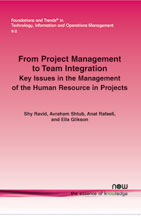From Project Management to Team Integration: Key Issues in the Management of the Human Resource in Projects
By Shy Ravid, Technion, Israel Institute of Technology, shyravid@gmail.com | Avraham Shtub, Technion, Israel Institute of Technology, shtub@ie.technion.ac.il | Anat Rafaeli, Technion, Israel Institute of Technology, anatr@ie.technion.ac.il | Ella Glikson, Technion, Israel Institute of Technology, ellaglik@tx.technion.ac.il
Abstract
The non-repetitive nature of projects, globalization, the growing number of distributed project teams, and the substantial number of high-tech projects in which the human brain is the most important resource are just few of the forces making human resource management in projects a critical success factor. These conditions challenge not only project team members' ability to collaborate, but also the capacity of the project manager to effectively manage human resources and to facilitate a collaborative work environment. The quantitative aspects of project management, such as scheduling, budgeting, and resource management, are supported by a large array of tools and techniques, many of them based on operations research methodologies and integrated into commercially available software for project management. However, these commercial software packages for project management offer very little support for the development and management of project teams.
In this monograph we review the project management and organizational behavior literature, focusing on key issues in the management of human resources in projects. We then present a model that relates the use of integrative project management tools and techniques to the development of a shared understanding in teams, and to the occurrence of effective team processes. From a practical point of view, we present team integration — the process by which the goals and work processes of individual team members are assembled into a coordinated whole — as an important success factor.
With the art and science of human resource management in projects growing increasingly important in today's global high-tech environment, we cannot ignore the gap between the needs of project managers and the tools available to support their efforts. Our model offers an approach toward overcoming this gap. We present some recent results of our research that support elements of this model, and also point to a new direction — the use of simulators to develop a shared understanding among project team members and to achieve team integration early in the project initiation phase. The results of our efforts to develop such tool — the Project Team Builder — are reported as well.
From Project Management to Team Integration
From Project Management to Team Integration shows that human resource management (HRM) in projects is unique and requires special consideration. It argues that the special challenges faced by project teams, and, in particular, their diversity in terms of the functional areas, backgrounds, perspectives, and even physical locations of team members, mean that for teams to succeed, their human and technical processes must be treated as an integrative whole. The authors' use of standard project management techniques that were originally designed to support technical aspects of projects is essential for project HRM, and specifically for the development of a shared understanding and a contribution to the development of the social processes that are required for effective teamwork.
